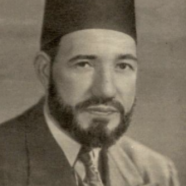Overview
Hassan al-Banna (1906-1949) was an Egyptian schoolteacher, an Islamic theologian, and the founder of the Muslim Brotherhood. He was a contemporary of Islamist ideologues Sayyid Qutb and Abul Ala Maududi, whose theories have helped form the violent Islamist ideology known as Qutbism.
As a young schoolteacher, al-Banna taught in the Suez Canal town of Ismailia, Egypt. He became increasingly angered by Western influence and morals, which he saw as a threat to Islam. To counter secularism and the modernization of Egypt, al-Banna began practicing dawa, proselytizing to young Egyptians with the message of returning to the early traditions of Muslim piety. He rejected the phenomenon of nationalism and instead espoused an ideology of pan-Islamic unity, marrying faith and nationalism in the hope of erecting an Islamic caliphate.Tarek Osman, Egypt on the Brink, (New Haven: Yale University Press: 2013); “Hassan al-Banna and his political thought of Islamic Brotherhood,” Ikhwanweb: The Muslim Brotherhood’s Official English web site, last modified May 13, 2008, http://www.ikhwanweb.com/article.php?id=17065.
In 1928, the charismatic schoolteacher formed the Society of the Muslim Brothers (the Muslim Brotherhood) in Ismailia. The organization grew rapidly as al-Banna launched branches across Egypt complete with mosques, schools, and sporting clubs. Under al-Banna’s leadership, the Brotherhood grew to operate approximately 2,000 branches throughout the country.“Profile: Egypt's Muslim Brotherhood,” BBC News, December 25, 2013, http://www.bbc.com/news/world-middle-east-12313405; Denis J. Sullivan and Kimberly Jones, Global Security Watch-Egypt: A Reference Handbook: A Reference Handbook, (Westport, Connecticut: Praeger Security International, 2008), 150.
In the 1940s, al-Banna formed the Brotherhood’s underground military wing, the “secret apparatus,” which focused its attacks on British rule in Egypt and Jewish presence in Palestine. He promoted jihad and what he called the “art of death,” reminding Brotherhood members of the Prophetic saying that “He who dies and has not fought and was not resolved to fight, has died a jahiliyya [non-Muslim, ignorant, or pagan] death.”Omar Ashour, “Myths and realities: The Muslim Brothers and armed activism,” Al Jazeera, August 12, 2014, http://www.aljazeera.com/indepth/opinion/2014/08/myths-realities-muslim-brothers--20148129319751298.html; “Profile: Egypt's Muslim Brotherhood,” BBC News, December 25, 2013, http://www.bbc.com/news/world-middle-east-12313405; “The Muslim Brotherhood: Understanding its Roots and Impact,” Foundation for Defense of Democracies, accessed September 10, 2015, http://www.defenddemocracy.org/the-muslim-brotherhood-understanding-its-roots-and-impact/.
In December 1948, the secret apparatus assassinated Egyptian Prime Minister Mahmoud an-Nuqrashi Pasha, who had recently banned the Brotherhood. Less than three months later, in February 1949, the Egyptian secret service assassinated al-Banna near his office, likely in retaliation for Nuqrashi’s murder.“Profile: Egypt's Muslim Brotherhood,” Al Jazeera, February 6, 2011, http://www.aljazeera.com/indepth/2011/02/201126101349142168.html;
“Hassan al-Banna,” Harvard Divinity School, accessed April 28, 2016, http://rlp.hds.harvard.edu/faq/hassan-al-banna;
Tarek Osman, Egypt on the Brink, (New Haven: Yale University Press: 2013);
John Mintz and Douglas Farah, “In Search of Friends Among the Foes: U.S. Hopes to Work with Diverse Group,” Washington Post, September 11, 2004, http://www.washingtonpost.com/wp-dyn/articles/A12823-2004Sep10.html;
Denis J. Sullivan and Kimberly Jones, Global Security Watch-Egypt: A Reference Handbook: A Reference Handbook, (Westport, Connecticut: Praeger Security International, 2008), 149.
Associated Groups
- Extremist entity
- Muslim Brotherhood
- Read Threat Report
- Type(s) of Organization:
- Non-state actor, political, religious, social service provider, transnational
- Ideologies and Affiliations:
- Islamist, jihadist, pan-Islamist, Qutbist, Sunni, takfirist
- Position(s):
- Founder
The Muslim Brotherhood is a transnational Sunni Islamist movement that seeks to implement sharia (Islamic law) under a global caliphate. Founded in Egypt in 1928, the Brotherhood is the country’s oldest Islamist organization and has branches throughout the world.
